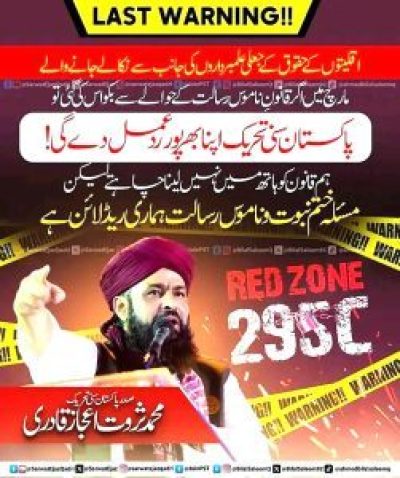Pakistani officials attempt to ban rights march organizers under pressure from extremist Islamist party

LAHORE, Pakistan — Sindh Province officials are trying to impose a ban on organizers of a minority rights march under pressure from an extremist Islamist party opposed to any changes in Pakistan’s harsh blasphemy laws, sources said.
In an official letter to the Commissioner of Karachi Division on Aug. 23, the Sindh Home Department stated that the organizers of the Minorities Rights March held on National Minorities Day, Aug. 11, had violated their responsibility “to uphold religious harmony and respect interfaith boundaries.”
“The SSP [Senior Superintendent of Police] has recommended that the NOC [No Objection Certificate] granted to Mr. [Luke] Victor and his associates may be prohibited from organizing any future events for violating the said code of conduct to prevent any potential law and order issues,” states the letter viewed by Christian Daily International-Morning Star News.
Tehreek-e-Labbaik Pakistan (TLP) and other Islamist parties, including the Jamiat Ulema-e-Islam and Sunni Tehreek, had earlier threatened the Sindh government with unrest if it allowed the minorities rights march on Aug. 11. The government initially withdrew the NOC granted to march organizers in Karachi but later allowed them to hold a gathering after protests against the decision.
Hundreds of TLP workers on Friday (Aug. 23) clashed with police outside the office of the Sindh Police Inspector General, demanding that a case be registered against march organizers for allegedly spreading “fake propaganda” against Section 295-C of Pakistan’s widely condemned blasphemy statutes. The law carries a mandatory death penalty for disrespecting Islam’s prophet Muhammad.
The TLP workers attacked policemen with stones, injuring several officers, and were dispersed only after senior police officials vowed that NOCs for such marches would not be given in the future.
Attorney Luke Victor, one of the organizers of the Minorities Rights March, said surrendering to illegal demands from extremist forces would not bode well for Pakistan.
“The TLP and some other Islamist parties had begun a campaign to stop the minorities march on the false pretext that we were demanding the abolition of the blasphemy laws,” Victor told Christian Daily International-Morning Star News from Karachi. “This is a blatant lie, because nowhere in our social media campaign and in the rally itself any such demand was made. Our demand has always been to stop the abuse of the blasphemy laws and the violence perpetrated against religious minorities in its name.”
The lawyer-activist rejected the propaganda that the march organizers were “anti-Islam” and “anti-Pakistan.”
“We are as much Pakistanis as they are, and we have never said or done anything that undermines Islamic teachings,” he said. “Our objective is a pluralistic Pakistani society where citizens belonging to all faiths, caste or creed can live freely. We are opposed to the abuse of the blasphemy laws against any citizen and have always urged the state to look into this issue with due seriousness.”
Victor said that march organizers and participants believed all religions preach peace and tolerance.
“This is the reason why many Muslims endorsed and participated in the gathering to show support for the just demands of the religious minorities,” he said. “We are demanding protection for vulnerable communities from societal discrimination and persecution, including abduction and forced conversion of underage Christian and Hindu girls, and their fundamental right to quality education, health and other privileges enjoyed by the majority community.”
Pastor Ghazala Shafique, another organizer of the minority rights march, lamented that some in the local Christian community were colluding with extremist groups for their vested interests.
“They have tagged me as an ‘Ahmadi’ and are falsely propagating that I’m promoting a ‘Qadyani [derogatory term for Ahmadis] agenda’ in the church,” Pastor Shafique said. “This is a very dangerous attempt to disrupt peace and interfaith relations and damage the church. The government should take strict notice of this propaganda which is strengthening extremist elements.”
The Ahmadis consider themselves a branch of Islam but are considered heretical by Pakistani Muslims, and Ahmadi worship places are often attacked by Islamist groups.
On Aug. 22, the Supreme Court of Pakistan was forced to dilute its verdict in a case pertaining to bail it granted to an Ahmadi after TLP activists called for the murder of the Chief Justice Qazi Faez Isa. Under immense pressure and threats, the Supreme Court announced that it was ready to review its verdict for a second time, a first in the country’s judicial history.
“I don’t want to say [it] but am helpless; I pray in every prayer that may God prevent me from making any wrong decisions,” Isa said as a three-judge bench headed by the chief justice ordered the exclusion of the controversial paragraphs from the verdict, including one related to freedom of religion in which the court had cited Article 20 of Pakistan’s Constitution.
Pakistan ranked seventh on Open Doors’ 2024 World Watch List of the most difficult places to be a Christian, as it was the previous year.
Originally published at Christian Daily International–Morning Star News





















